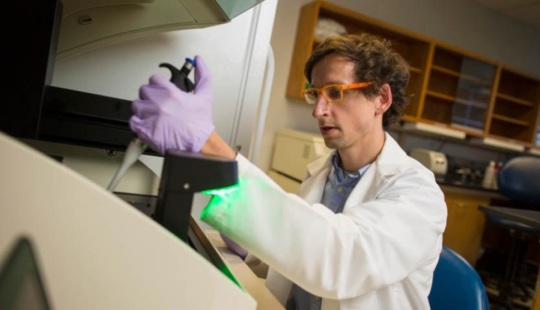The Pediatric Brain Tumor Foundation’s funding is helping researchers advance methods to more quickly and accurately diagnose and monitor childhood brain cancer. We teamed up with longtime funding partner Catching Up With Jack to bring the QIAcube, an innovative and advanced centrifuge technology, to Dr. Carl Koschmann’s Koschmann Lab at the University of Michigan.
The QIAcube will enable the Koschmann Lab to further develop liquid biopsy tests, building on the results made possible by the Pediatric Brain Tumor Foundation and Catching Up With Jack’s previous grants.
A relatively new and promising approach to detecting brain tumors, liquid biopsy tests screen a patient’s cerebrospinal fluid, blood, or plasma for the presence of circulating tumor DNA. The QIAcube automates the purification of DNA, RNA, and proteins, eliminating human error and significantly speeding up the process.
“Delays in diagnosis lead to delays in treatment – time that kids with brain cancer don’t have,” says Courtney Davies, President and CEO of the Pediatric Brain Tumor Foundation. “The Pediatric Brain Tumor Foundation’s initial funding to support Dr. Koschmann’s liquid biopsy research has resulted in promising advances for quicker, more accurate diagnoses. We’re proud to work with longtime funding partner Catching Up With Jack to continue supporting this game-changing screening method and get it out of the lab and into clinics faster.”
The Catching Up with Jack charitable fund was created to honor 11-year-old Jack Fineske, who passed away from brain cancer in 2015. Over the past seven years, Jack’s family and friends have inspired their community to raise more than $750,000 for pediatric brain cancer research and hospital programs.
“We were so well taken care of during our battle, we wanted to create an organization that allowed the community to band together as they did for us and help other families,” shared Brady Fineske, Jack’s dad, when speaking with WTVG in Toledo, Ohio about their annual fundraiser. “One of the therapies we funded through research and our partnership with the Pediatric Brain Tumor Foundation was named the breakthrough therapy of the year. That is incredible. We may have expected that after ten years, but not only after five years. It’s now being used to help cure kids, and it’s working.”
The Pediatric Brain Tumor Foundation and Catching Up With Jack’s funding of the QIAcube brings the Koschmann Lab one step closer to making liquid biopsy tests more readily available in the clinic – improving the diagnosis and monitoring of high-risk brain tumors in children.
Typically, doctors diagnose and analyze a child’s brain tumor by harvesting tissue during a surgical biopsy or resection. Depending on the location and type of tumor, these methods can be invasive or might not be able to extract a sample. In addition to offering a quicker, less invasive diagnostic tool, liquid biopsies can also help children by making it easier to monitor mutations after diagnosis. Fast-growing and aggressive brain tumors can mutate quickly and often, making treatments ineffective unless physicians can carefully follow changes in the tumor and adapt therapies accordingly.
“The support from the Pediatric Brain Tumor Foundation and Catching Up With Jack has been essential for us to develop liquid biopsy tests,” Dr. Koschmann shares on Michigan Medicine’s blog. “As we get close to the finish line with some of these tests, we realized we needed a device to standardize isolation of cell free tumor DNA from specimens. The QIAcube will certainly expedite our process of bringing these tests to the clinic.”
Jack Wadden, Ph.D., a research fellow in the Koschmann Lab with expertise in electrical engineering and computer science engineering, has been using the QIAcube in his work and sees the tool improving the repeatability and reliability of testing methods so that liquid biopsy tests will soon be accessible to patients and families.
“The consistency of the QIAcube will help us standardize these tests and get them validated quicker and at a lower cost,” Dr. Wadden says. “And apart from the liquid biopsy work, it has also had spillover effects into the rest of the lab, helping almost everyone who is doing basic cancer science to improve productivity when performing large, complex experiments.”
Accelerating progress for children with brain cancer is at the heart of the Pediatric Brain Tumor Foundation’s mission. The largest patient advocacy funder of pediatric brain tumor research, our seed funding brings scientists’ novel concepts and new approaches from idea to lab to clinic faster.
You play a critical role in making sure progress like this doesn’t stop. While the need for pediatric brain cancer research grows, funding is shrinking. Donate now to close the funding gap and help the Pediatric Brain Tumor Foundation make more discoveries possible for kids with brain cancer.


